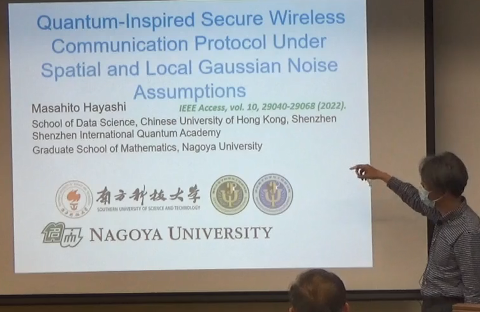
Inspired by quantum key distribution, we consider wireless communication between Alice and Bob when the noise generated in the intermediate space between Alice and Bob is controlled by Eve. Our model divides the channel noise into two parts, the noise generated during the transmission and the noise generated in the detector. Eve is allowed to control the former, but is not allowed to do the latter. While the latter is assumed to be a Gaussian random variable, the former is not assumed to be a Gaussian random variable. In this situation, using backward reconciliation and random sampling, we propose a protocol to generate secure keys between Alice and Bob under the assumption that Eve’s detector has a Gaussian noise and Eve is not so close to Alice’s transmitting device. In our protocol, the security criteria are quantitatively guaranteed even with nite block-length code based on the evaluation of error of the estimation of the channel. This result was published as IEEE Access, vol. 10, 29040-29068 (2022).
Masahito Hayashi was born in Japan, in 1971. He received the B.S. degree from the Faculty of Sciences, Kyoto University, Japan, in 1994, and the M.S. and Ph.D. degrees in mathematics from Kyoto University, in 1996 and 1999, respectively.
He worked in Kyoto University as a Research Fellow of the Japan Society of the Promotion of Science (JSPS), from 1998 to 2000, and worked in the Laboratory for Mathematical Neuroscience, Brain Science Institute, RIKEN, from 2000 to 2003, and worked in ERATO Quantum Computation and Information Project, Japan Science and Technology Agency (JST) as the Research Head, from 2000 to 2006. He also worked in the Superrobust Computation Project Information Science and Technology Strategic Core (21st Century COE by MEXT) Graduate School of Information Science and Technology, The University of Tokyo as an Adjunct Associate Professor, from 2004 to 2007. He worked in the Graduate School of Information Sciences, Tohoku University as Associate Professor from 2007 to 2012. In 2012, he joined the Graduate School of Mathematics, Nagoya University as Professor. In 2020, he joined Shenzhen Institute for Quantum Science and Engineering, Southern University of Science and Technology, Shenzhen, China, as the Chief Research Scientist. His research interests include classical and quantum information theory and classical and quantum statistical inference.
In 2011, he received Information Theory Society Paper Award in 2011 for Information-Spectrum Approach to Second-Order Coding Rate in Channel Coding. In 2016, he received the Japan Academy Medal from the Japan Academy and the JSPS Prize from Japan Society for the Promotion of Science.
He is, Fellow of IEEE, the Institute of Mathematical Statistics (IMS) Fellow and the Asia-Pacific Artificial Intelligence Association (AAIA) Fellow. In 2006, he published the book Quantum Information: An Introduction (Springer), whose revised version was published as Quantum Information Theory: Mathematical Foundation from Graduate Texts in Physics (Springer, 2016). In 2016, he published other two books Group Representation for Quantum Theory and A Group Theoretic Approach to Quantum Information (Springer). He is on the Editorial Board of International Journal of Quantum Information.
